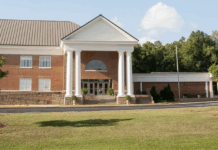
Tightening corporate security used to mean hiring guards and installing card access. Today it involves conducting threat audit assessments and installing stronger firewalls and VPNs.
Cybersecurity expertise is the golden ticket in the modern workforce. Companies are scrambling for it. Not enough employees have it.
A new high school program in Huntsville is addressing America’s shortage of cybersecurity and engineering talent. And big-name companies across Alabama and the country are donating to help.
The businesses’ support is partly philanthropic because of the greater national need, but practical, too, because companies really want those highly trained future workers. Unfortunately, cybersecurity attacks and data breaches become more destructive every day.
Raytheon Technologies gave a $4 million grant to the new Alabama School of Cyber Technology and Engineering, or ASCTE. Leidos kicked in $1 million. Deloitte pledged another million.
The long list of donors includes Redstone Federal Credit Union, Northrop Grumman, Alabama Power, Davidson Technologies and Blue Cross Blue Shield. The City of Huntsville spent roughly $1.8 million for 25 acres of prime research park land to donate for the new school building.
ASCTE President Matt Massey says the corporate donations “support the construction of the school, which includes a dormitory for 150 students, enabling students from all corners of the state to access this specialized educational opportunity.”
Massey, former superintendent of the Madison County School System, says the construction cost of the building is roughly $33 million. The ASCTE Foundation will own the building and lease it to the school.
A list of the school’s “partners in education” for the project includes 37 corporations, small businesses and governmental entities.
“I think it’s really the first time industry and the public have come together to solve the problem in a pretty unique way,” says Massey. Four years of specialized courses in grades 9-12 will “get these high schoolers ready for college and the workforce all at the same time.”
At the time Raytheon announced its major donation, Alabama Gov. Kay Ivey said “leadership from the private sector will play a big part in maximizing the potential” of the Huntsville school’s program.
The school’s students will learn technical skills that affect everything from locking in the security of a consumer credit card to protecting the mission of warfighters.
“It’s essential to our national security,” says Melissa Dueñas, Leidos senior vice president.
“With workforce shortages across the cybersecurity industry, cyber education is crucial to preparing and developing cyber professionals who can design and implement future safeguards for business and commerce, education, government agencies and other organizations,” she says.
Leidos is choosing to partner with ASCTE because it’s “pivotal to tackling challenges like the acute cyber talent shortage.
“Leidos is proud to invest in ASCTE to further develop talents that are mission critical to our nation,” Dueñas says.
Because the school integrates cyber technology and engineering into all its disciplines, its students “are prepared in practice and theory to enhance the higher education pipeline and build the cyber and STEM workforce of the future,” she adds.
Teresa Shea, vice president of cyber offensive and defensive experts for Raytheon Intelligence and Space, is a strong supporter of ASCTE. She participated in Introduce a Girl to Engineering Day there earlier this year.
The company’s $4 million grant “is one of our largest single investments in STEM education and cyber talent development,” she says. Raytheon is the school’s largest corporate donor.
The school is developing the next generation of cyber and engineering professionals, Shea says.
“As the nation’s first and only high school focused on integrating cyber technology and engineering into all academic disciplines, they play a critical role in expanding access to STEM education and are serving as the blueprint for magnet schools across the nation who want to implement a STEM-based curriculum,” Shea adds.
Raytheon also is partnering with ASCTE to develop an advanced curriculum and provide technical resources and mentors to enhance the students’ skills and experience.
Like many companies, Raytheon already has plans for these bright young people.
“We hope that one day, graduates of this great school will work for great organizations like Raytheon Technologies that are committed to learning and innovation,” Shea says.
Donors to the cyber and technology school tend to agree that educating students in these skills is — or should be — one of the country’s top priorities. They call it “closing the talent gap.”
“Deloitte works closely with ASCTE to inspire and train America’s next generation of cybersecurity professionals, because our national security depends on maintaining a highly skilled and diverse cyber workforce,” says Carey Miller, managing director of Deloitte & Touche LLP.
“We focus intently on increasing opportunities for historically underrepresented and underserved communities to access high-quality education — like the cyber and engineering programs offered at ASCTE,” she adds.
By closing the cybersecurity talent gap in Alabama and across the country, Miller says “we can build a robust and sustainable workforce that helps local communities thrive, protects critical infrastructure and keeps America safe.”
The students’ success really affects everyone.
As Dueñas at Leidos says, “the skills ASCTE graduates bring will undoubtedly make a world of difference for all of us.
“These individuals will be on the cyber front lines and will have the knowledge and know-how to protect and defend so many facets of our daily lives.”
ASCTE currently operates in temporary space on the campus of private Oakwood University. The new building under construction at Wynn Drive and Bradford Drive in Cummings Research Park is expected to open in August 2022, with a predicted 350 commuter and residential students by 2024.
The public magnet high school teaches physics, calculus, engineering and cyber courses to students from throughout the state. Tuition is free.
Freshman courses include the history of engineering, mathematics of data and introduction to cyber and computer. This year, 60% of the students live on campus.
Current enrollment includes students from 42 different zip codes across Alabama.
ASCTE’s stated vision expects the program will “become a national model in collaboration with government agencies, industry and higher education in cyber engineering.”
Deborah Storey is a Huntsville-based freelancer for Business Alabama.
This story originally appeared in the December 2021 issue of Business Alabama.



